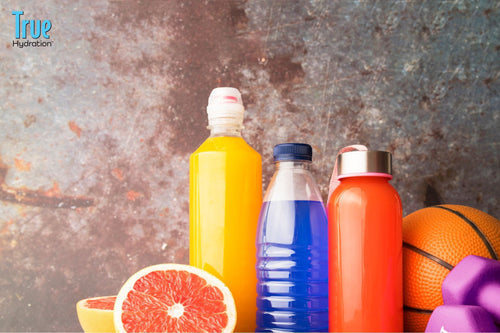Key Takeaways
- Hydration plays a key role in supporting healthy blood pressure levels.
- Dehydration can increase cardiovascular strain.
- Natural hydration offers benefits without added ingredients that may counter your goals.
- Understanding what goes into your drink matters when managing hypertension.
How Does Hydration Help Manage Blood Pressure
High blood pressure, or hypertension,¹ affects nearly 1 in 3 adults aged 18 to 74 years-old in Singapore. Often linked to factors like stress, poor dietary habits, and sedentary lifestyles, it’s a condition that develops over time. However, it can also be exacerbated by poor hydration habits.
Beyond medical treatments, maintaining consistent fluid intake is a factor to overall cardiovascular balance. In this article, we will explore the relationship between fluid levels and blood pressure, and why natural hydration should be part of your daily routine, particularly if you're seeking natural remedies for hypertension.
How Dehydration Affects Blood Pressure
When the body lacks sufficient fluids, blood volume decreases. In response, the body constricts blood vessels to maintain pressure levels, a reaction that can temporarily raise blood pressure. For individuals already managing hypertension, this creates unnecessary stress on the cardiovascular system.
In warm, humid climates like Singapore, even mild dehydration can have noticeable effects. Excessive perspiration or inadequate water intake, particularly during daily commutes or workouts, may impact blood pressure readings.
Consistent hydration helps buffer against these fluctuations and reduces strain on your heart and arteries.
Hydration Supports Cardiovascular Function
Water is not simply for quenching thirst. It plays a direct role in supporting your heart.² When fluid intake is adequate, the heart pumps more efficiently due to healthy blood volume. This, in turn, helps blood vessels remain more elastic, supporting smoother blood flow and lower resistance.
Hydration also plays an indirect role in supporting kidney function, a key element in blood pressure regulation. When kidneys receive adequate fluid, they perform more effectively in managing sodium and fluid balance in the body.
Incorporating hydrating drinks into your diet helps sustain these essential physiological functions.
How Natural Hydration Compares to Artificial Alternatives
Many popular beverages marketed for hydration contain ingredients that may not support cardiovascular wellbeing. Added sugars, sodium, and caffeine are common in these drinks and contribute to increased blood pressure when consumed frequently.
Some hydration drinks replace sugars with artificial sweeteners. While these may seem like a better option, research suggests that artificial sweeteners may influence metabolic processes in ways that are still being studied.³
This is where natural hydration becomes relevant. Drinks that rely on minimal processing, contain no artificial additives, and deliver essential electrolytes without overstimulating the body offer a gentler, more supportive option.
What to Look for in a Blood-Pressure-Friendly Drink
If you're actively managing your blood pressure, consider what’s in your drink:
-
No added sugar or artificial sweeteners
Reduces potential impact on insulin and metabolism. -
Low or no sodium
Minimises fluid retention. -
Contains supportive electrolytes
Ingredients like magnesium and potassium are commonly found in electrolyte drink options, but must be balanced. -
Natural flavouring or mineral enhancements
Avoids unnecessary additives that don’t contribute to hydration. Reviewing labels can help ensure that your hydration choices align with your health priorities.
How Much Is Enough? Hydration Guidelines for Adults in Singapore
The Health Promotion Board generally recommends 6–8 cups of water per day.⁴ However, Singapore’s climate and lifestyle often call for more. Heat and humidity increase perspiration, leading to greater fluid loss, especially for those who are physically active.
Rather than consuming large amounts of water at once, it’s more effective to drink moderate amounts steadily throughout the day. This approach helps maintain fluid balance and supports cardiovascular stability.
If you're using women's health supplements or other daily wellness products, it’s also important to ensure you're hydrated, as many bodily processes depend on water for absorption and distribution.
Supporting Heart Health One Sip at a Time
Alongside professional medical care, hydration remains one of the simplest daily habits you can manage to support your overall wellbeing. Proper fluid intake plays a quiet but important role in cardiovascular function, kidney health, and blood pressure regulation.
Choosing natural hydration options that avoid excess sodium, sweeteners, or stimulants helps minimise external stressors on the body, an approach that may be especially helpful for individuals exploring natural remedies for hypertension.
At True Hydration™, we believe in hydration that aligns with your goals, no unnecessary additives, no overstated claims. Just balanced support for your everyday routine. Explore our range of hydrating drinks made with wellness in mind today.
References:
-
National Heart Centre Singapore. (2025). Hypertension – The silent killer and its impact on health. Murmurs (Issue 49). National Heart Centre Singapore. https://www.nhcs.com.sg/publication/murmurs/hypertension-the-silent-killer-and-its-impact-on-health
-
Heart Foundation. (2019). The importance of water. The Heart Foundation. https://theheartfoundation.org/2019/03/08/the-importance-of-water
-
Sylvetsky, A. C., Rother, K. I., & Brown, R. J. (2011). Artificial sweetener use among children: epidemiology, recommendations, metabolic outcomes, and future directions. Pediatric Clinics of North America, 58(6), 1467–1480. https://doi.org/10.1016/j.pcl.2011.09.003
-
Health Promotion Board Singapore. (2022). Hydration: How much water should you drink every day? https://www.healthhub.sg/live-healthy/1656/hydration-facts


